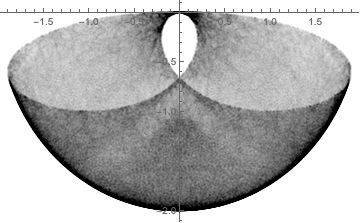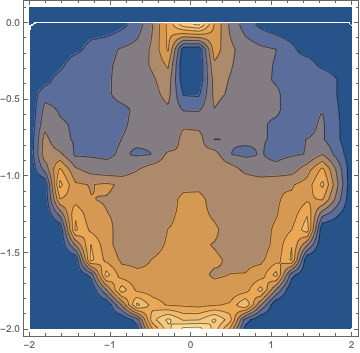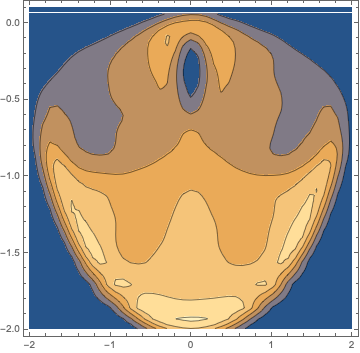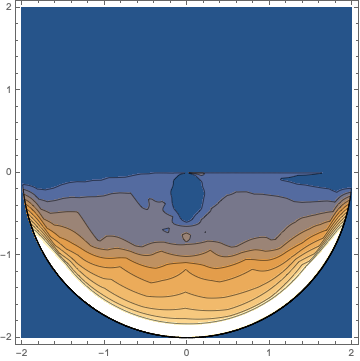Here's an alternative visualization that uses ListPlot with a very low Opacity:
ListPlot[Table[Evaluate[{x2[t], y2[t]} /. soldp], {t, 0, 15000, 0.01}],
PlotStyle -> {Black, Opacity[0.002], PointSize[0.005]}]

Otherwise, SmoothKernelDistributionSmoothKernelDistribution has two options for smoothing kernels that seem potentially useful if they could only be combined -- "Bounded" and "Radial".
d = SmoothKernelDistribution[
Map[Function[Evaluate[{x2[#], y2[#]} /. soldp]], Range[0, 15000, 0.025]],
Automatic, {"Bounded", {{-2, 2}, {-2, 0}}, "Gaussian"}];
ContourPlot[PDF[d, {x, y}], {x, -2, 2}, {y, -2, 0.1}, MaxRecursion -> 3, PlotPoints -> 50]

d = SmoothKernelDistribution[
Map[Function[Evaluate[{x2[#], y2[#]} /. soldp]], Range[0, 15000, 0.025]],
Automatic, {"Radial", "Gaussian"}];
ContourPlot[PDF[d, {x, y}], {x, -2, 2}, {y, -2, 0.1}, MaxRecursion -> 3, PlotPoints -> 50]

Those are both kind of horrifying. Maybe the general kernel specification func could be pressed into service by someone smarter than me!
Addendum:
Maybe a trip through polar coordinates makes the "Bounded" option more useful. (I wonder if this needs to be corrected for the effect of changing the area of different volumes of phase space...)
dat = Map[Function[Evaluate[{x2[#], y2[#]} /. soldp]], Range[0, 15000, 0.025]];
pdat = ToPolarCoordinates[dat];
d = SmoothKernelDistribution[pdat, Automatic,
{"Bounded", {{0, 2}, {0, 2 \[Pi]π}}, "Gaussian"}];
ContourPlot[Evaluate[PDF[d, {r, \[Theta]θ}] /. {r -> Sqrt[x^2 + y^2], \[Theta]θ -> ArcTan[x, -y]}],
{x, -2, 2}, {y, -2, 2}, PlotPoints -> 200, Contours -> 10, PlotRange -> {0, All}]

Getting better, but still kind of hideous! Polar ContourPlot thanks to this old answer by @rcollyer (with an extra minus sign before y, because ???)
